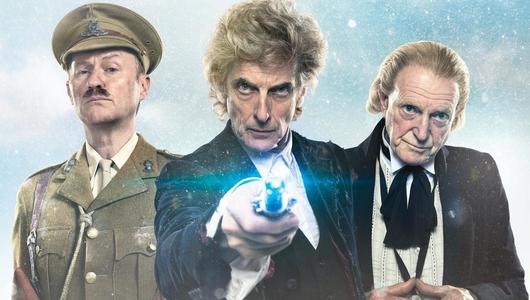Peter Capaldi, Pearl Macky and David Bradley headline the 12th Doctor’s swan song, as the traditional Doctor Who Christmas episode gives way to another newer, female Doctor played by Jodie Wittaker. As the final episode for show runner Steven Moffat as well, Twice Upon a Time has a lot of ground to cover which is the perfect opportunity to reflect on the different Doctors and the regenerations that came before.
• Production Company: BBC
• Original Network: BBC One
• Showrunner: Steven Moffat
On the back of Doctor Who’s 50th anniversary in 2013, it was announced that Peter Capaldi would take over from Matt Smith as the technical 12th Doctor (or contentious, 13th regeneration). It was a return to form for Moffat who had obstinately rebooted Who (again) and taken it in a decidedly progressive direction since Smith replaced David Tennant. Peter Capaldi, as both an older, seasoned actor as well as a lifelong fan, was the answer to many fans wishes.
Since then Moffat has continued the fan service but not without making sure that he stamps his mark on everything, including a female incarnation of the Master and, in the most recent season 10 in 2017-, the first openly gay companion (with a “boy’s name”) in Pearl Mackie’s Bill Potts. Not unlike the final episode The Time of the Doctor for Matt Smith back at Christmas 2013, Steven Moffat can’t seem to help himself; doubling down in Twice Upon a Time on an episode that features not one but two Doctors again.
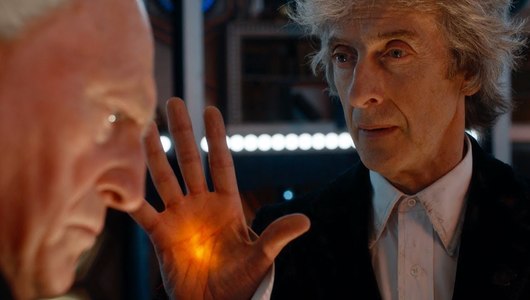
Almost as if to remind audiences of everything he has brought to new Who, Steven Moffat reprises David Bradley as the very first Doctor in an episode that works to fill a supposed gap way back in 1963 when the first Doctor regenerated that is pure fan theory.
It is a literal tick box of all the tropes that the writers and producers have brought along in the last 7 years:
- Mark Gatiss seemingly inviting himself along for the ride as yet a different character that also loops back in and connects to a classic persona? Check
- Two Doctors & two Tardis for the price of one? Check
- A mix bag of every piece of Murray Gold’s most memorable music? Check
- Resurrecting a dead companion who may or may not have actually died last season? Check
- Wonderfully dark and shot battlefields with wide angle camera tracking and physical props? Check
- Poorly, lazily conceived and contrived CGI ‘bad guys’ that aren’t actually bad or even important? Check
- Progressive commentary on sexism, women and technology? Double check
And finally, in memory of the 50th anniversary episode, if someone can tell me how in Twice Upon a Time Capaldi got his Tardis back, which was last seen entering the bad guys space ship and never revisited or explained ….
Twice Upon a Time is not a bad episode of Who. As a Christmas story, it has a bitter sweet ending that morphs into someone that I hope can do Doctor Who justice. It’s simply and sadly a case of one episode too many that existed partly because it had to, commissioned as it was by the BBC, and partly to tide viewers over till later in the year when the new season resumes under new show-runner Chris Chibnall. Whether it’s the length of Who over the last 12 years or the disparate broadcasting, taking up to a year off between seasons, sometimes Peter Capaldi’s last season in and of itself started to wear a bit thin.
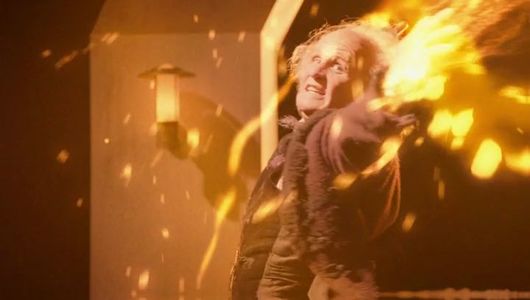
Similarly Matt Smith’s final episode whilst a tour de force for the actor, indulged him almost too much allowing Matt Smith to do whatever he does best creating a wacky bloated and confusing episode that refused to slow down until the very end. It didn’t help that Smith had already left the show, shaved his head and was forced to return wearing a wig. His regeneration sequence though was fittingly explosive, quick and reflective allowing just enough time for him to fully grasp the consequence of both his actions and his long life.
In contrast, Capaldi has been dying the slow death, seemingly staving it off since the middle of season 10 not exactly refusing to die but simply sucking it in, refusing actually to regenerate but not really doing anything to stop it. The irony is that Twice Upon a Time seems to want to highlight the uselessness of the Doctor, as he encounters problems that aren’t important and an over-stated and put-down misogynistic first Doctor that doesn’t seem to care for what he may become. To top it off companion, Bill spends the entire episode trying to tell him she is still alive, but that it doesn’t matter if she isn’t anyway because memories are more important – so which is it, Bill!?
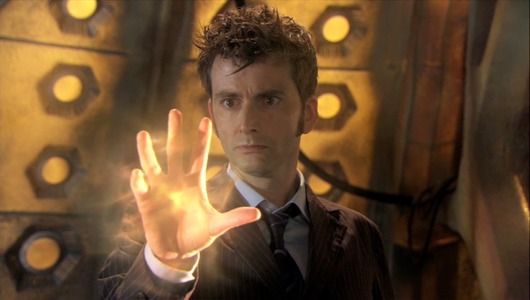
Way back in 2009, David Tennant also regenerated in The end of time parts I & II and as a double episode over Christmas and New Years’ it was possibly the best handled and realized regeneration of new Who. One of the hallmarks of the Moffat era has been “magical” and contrived ways to justify anything, including at the end of their long lives Smith and Capaldi revisiting past companions:
Matt Smith seemingly hallucinated, after his existential crisis in a well realized scene that didn’t bear explanation. Capaldi’s 12th doctor though has to content with a shape shifting alien that only wants to remind him of his memories, such that Capaldi actually calls out the ridiculous logic bluffs at every turn that the show then brushes off.
In contrast, David Tennant took the much more logical and straight forward approach to simply revisit his companions using time travel, to see them one last from afar that had all the weight and sadness of ‘the lonely God’ he had become. By the end of all things, Tennant had gone down swinging, beaten bloody and bruised requiring a heroes exit in line with existing showrunner Russell T Davies.
It was the end of an era and one that has yet to be repeated. The season finale of season 10 saw the return of John Simm as the Master, in yet another double billing for a famous character. Some of that previous violence taken out on Tennant was brought back and in truth probably would have and should have been the bowing out of Capaldi’s tenure on the show. It was also a glimmer of hope that Moffatt had learnt from feedback and wanted to recapture what had made the 10th Doctors regeneration so special.
There is a lot to say about Doctor Who and a lot of different ways to take this episode. Not even touching on the fact that this was also the last time composer Murray Gold will be involved since his start back in 2005, having create all Doctor and companion theme tunes.
Jodie Wittaker has big shoes to fill, hopefully changing and rejuvenating the show once again. The hope is for a more straight forward simpler show that is less convoluted and remembers to explain itself. Early teasers may indicate towards the darkest and possibly ‘spookiest’ series tonally similar to Wittaker’s previous work with Chibnall on Broadchurch. Regardless, the era of Steven Moffat is over as is Peter Capaldi’s. Is the world ready for a female Doctor? Who knows …
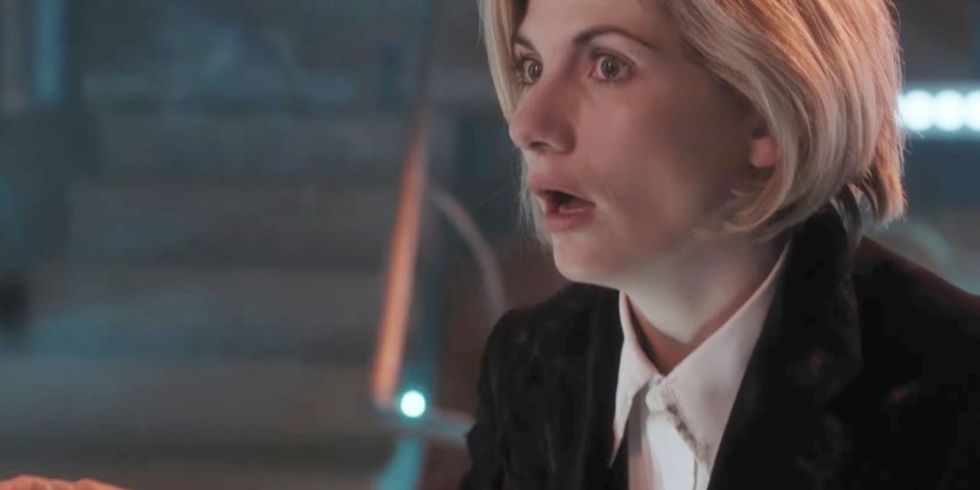
Official Show Site
